ANAMBRA (FIC AWKA) Five Communities in Anambra State, Ezira, Nnewi, Neni, Obosi and Nise, have benefitted from Unicef, on Essential Family Practices (EFPs).
The UNICEF Desk Officer, Anambra State Ministry of Information and Public Enlightenment, Awka, Mrs. Chineze George-Ileka, stated that UNICEF was concerned about reducing mother and child mortality and morbidity rates.
Mrs. George-Ileka noted that women and children were agents of change. The training she stated, was meant to enable them change the narrative of failure to that of breath- taking success in their communities. She emphasized that personal, family and community cleanliness would promote good health that was essential for growth and development.
The Desk Officer also noted that people were always in a hurry to eat whatever came their way without properly washing their hands, stressing that, most illnesses and deaths were caused by germs that get into the mouth through food, unsafe water and dirty hands.
She demonstrated how best to wash hands using soap and running water, advising them to air-dry their hands after washing as the use of general hand towel could be contagious. She also demonstrated how to wash the mouth properly using chewing stick/tooth brush to avoid mouth odour, urging them to drink water always to reduce the acidic content of the stomach.
On sanitary cleanliness, Mrs. George-Ileka emphasized that hygiene was necessary during monthly cycle as clean and dry sanitary pads/cloth should be available for girls and women. She said sanitary pads should be disposed properly with other refuse or buried.
She advised that clothes used during menstruation should be washed regularly with soap and clean water and dried fully in the sun before the next use, pointing out that poor menstrual hygiene can lead to infections and repeated infections of the birth canal and can cause infertility.
She therefore urged them to put in their best to achieve behavioral change in the lives of their community members so as to actualize UNICEF’s dream.
Dr. Rose Amasiani, Anambra State Hygiene Promotion Officer, decried the attitude of those who defecate on open surfaces and dump refuse indiscriminately, which constitute health hazards.
She said the toilet was the safest place to throw away faeces to avoid the spread of diseases and also called for thorough washing of hands using soap or ash under running water, as necessary after contact with faeces, such as after using the toilet, cleaning up babies’ buttocks before feeding children.
Health Educator, Mrs. Scholar Okoli, said that every woman had rights to healthcare, especially during pregnancy and childbirth, pointing out that pregnant women need to be checked by skilled birth attendants, and that exclusive breastfeeding was the only food and drink that an infant would need until the age of six months after which different kinds of food would be introduced.
She advised the women to make sure that their babies suck the first yellowish milk (colostrum) that comes out of the breast as it helps to fight germs that cause diseases.
Okoli also disclosed that breastfeeding helps to protect babies and young children against dangerous illness, creating special closeness between mother and child and prevents unplanned pregnancy.
On immunization, she said that vaccination was urgent and compulsory as it helps the child to fight against major killer diseases noting that a child who is not vaccinated is more likely to become sick, permanently disabled or become malnourished and dies.
The EFPs include personal and environmental hygiene, open defecation free (ODF), HIV prevention, antenatal/postnatal care, exclusive breastfeeding and immunization.
Signed by
Asika Ikemefuna






